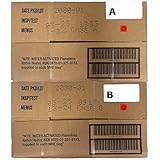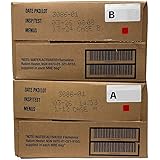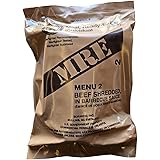Maintain a Balanced Diet
Understanding Nutritional Needs
When you find yourself in a long-term disaster scenario, the first thing I always do is evaluate my dietary needs. It’s easy to fall into the trap of stocking up on just canned goods or whatever is easy to grab, but that won’t sustain you in the long run. Knowledge is power, and understanding what nutrients your body requires is key to staying healthy.
Focus on incorporating a variety of food groups. You’ll want to ensure you’re getting adequate proteins, fats, carbohydrates, vitamins, and minerals. This might mean blending traditional foods with emergency supplies. Remember, when you know what your body needs, you’re less likely to just default to junk food because it’s available.
Also, think about portion sizes. Just because you’re in a situation where food may be limited doesn’t mean you should skip meals or completely wipe out your food storage in one go. Eat balanced meals throughout the day to keep your energy levels up and your morale high.
Smart Food Storage
Storing food properly can make all the difference. I learned the hard way that a poorly organized pantry can lead to wasted resources. Use airtight containers, label items with expiration dates, and keep an inventory of what you have on hand. This way, you’ll avoid the dreaded “what’s lurking in the back of the cupboard” syndrome!
Additionally, explore the idea of canning or dehydrating your food if you’ve got the skills or motivation. Not only is it a practical approach, but it also expands your supplies without needing refrigeration. This was a game changer for me when things got tough.
Lastly, always keep an eye on your food stores. Rotate them regularly, so you’re consuming older supplies first, ensuring nothing goes to waste. It helps in not only keeping your diet balanced but also in maintaining good hygiene during challenging times.
Hydration is Key
One thing I can’t stress enough is staying hydrated. Sometimes in survival situations, we forget how crucial water is. It’s not just about filling your belly; it’s about keeping your body functioning well under stress. I always keep water purification methods on hand, like filters or purification tablets, just in case our water source gets compromised.
You’ll find that investing in good quality water containers can pay off too. Having enough safe drinking water can keep spirits high and energy levels even higher. Remember, dehydration sneaks up on you, especially if you’re stressed about the situation at hand. One sip at a time!
== > What if ... Get a FREE Subscription to PREPARE
Also, consider electrolyte solutions or powders if you’re feeling especially drained. They’re compact, easy to store, and can help normalize your body’s functions, particularly if you’re exerting yourself more than usual.
Physical Activity and Mental Wellbeing
Establish a Routine
Creating a daily routine is something I’ve found incredibly helpful during prolonged times of uncertainty. I recommend structuring your day to include not just tasks related to survival, but also activities that promote physical health and mental clarity. Morning stretches or any kind of movement can significantly set a positive tone for your day.
Incorporate activities like yoga, calisthenics, or even just a brisk walk. This promotes blood circulation and helps keep your mind alert. Plus, moving your body can do wonders for your mental health, reducing anxiety and frustration that often comes with stressful situations.
Another important thing is to be flexible with your routine. It can be easy to become rigid in tough times, but remember, flexibility can lead to discovering new ways to keep active that you might not have considered before.
Connect with Others
One of the biggest benefits of preparing for a disaster scenario is finding your community. Connecting with others in similar situations can be a breath of fresh air. Engaging in activities together, whether it’s working on survival skills or simply sharing meals helps lift the spirits. I’ve met some really great people who brought a refreshing perspective during tough times.
Support groups can also help maintain mental toughness. Sharing experiences, challenges, and successes can be a powerful motivator. It’s about forming bonds and fostering a support system that can help you navigate the chaos together.
Plus, online forums or local groups can provide an avenue for sharing tips, resources, and encouragement. Justice for mental health benefits and embracing the “we’re in this together” mentality can work wonders for morale.
Mental Health Practices
Mental health often takes a back seat during crises, but I’m here to tell you it’s just as important as physical health. A few practices I enjoy are journaling and mindfulness exercises. Writing down thoughts can help clear my head, allowing me to process what I’m feeling and make space for solutions.
Additionally, consider incorporating meditation or breathing exercises into your daily routine. It may sound cliché, but finding time to breathe deeply really helps focus and ground yourself, especially in a high-stress environment.
Finally, don’t hesitate to express your feelings. Whether it’s through art, talking to friends, or even yelling into the void, it’s okay to let emotions out. The important part is to create an outlet—something that allows you to decompress and re-engage with your surroundings positively.
Get Preparedness and Self-Reliance Tips. Subscribe Now!
Utilize Available Resources Wisely
Research and Educate Yourself
Being prepared means knowing what’s available around you. I can’t stress enough the importance of doing your homework beforehand. Whether it’s local resources, community programs, or skills that can be learned online, being informed allows you to act decisively when needs arise.
Investing time to learn first aid or basic survival skills beforehand can easily translate into healthier living during a crisis. Plus, you never know when that knowledge might save you or a loved one. I learned how to create a basic first aid kit, and the peace of mind that came with that knowledge was priceless!
Also, utilize local libraries or community centers for resources. These places often have a wealth of information and might even offer workshops you can join. You never know what gems of wisdom you might come across!
Sharing and Trading Resources
If you have a stockpile, consider what you might be able to trade with others. Find mutual companions and consider swapping skills or supplies. I know it sounds somewhat like bartering, which has become a bit of a buzzword recently, but actually implementing it can offer all parties involved something beneficial.
I’ve had great success teaming up with neighbors to share resources like seeds, gardening tools, and even canned goods. You can combine what you have and use it in a way that benefits everyone. The motto here is fewer “survival of the fittest” and more “survive together!”
Think broadly and be open to unexpected collaborations. Often, you may find new avenues for connection and resourcefulness that had you feeling isolated before.
Stay Informed on Health Guidelines
In disaster situations, health guidelines may shift and change based on the circumstances and available information. Keeping up to date with local and global health guidelines can make a big difference. Remember, what’s safe one day may not be the next!
Use reputable sources for updates. I personally follow CDC and WHO updates. Knowing potential preventative measures or understanding how outbreaks can affect your specific situation allows you to adapt accordingly.
Don’t hesitate to ask questions or seek clarification from health professionals. Community health workers or professionals may be available to guide you. They often have valuable insights tailored to local needs and can answer any concerns directly, helping guide you through the chaos.
Maintain Hygiene and Health Practices
Basic Hygiene Techniques
Your physical health starts with cleanliness. In any disaster scenario, keeping up with basic hygiene practices is essential to ward off sickness. Simple things like washing your hands regularly, especially before meals and after using the restroom, go a long way in preventing illnesses.
Additionally, establishing a cleaning routine helps keep living areas tidy, which can boost morale. I recommend assigning different tasks to different family members to make it a group effort. After all, teamwork makes the dream work, right?
Also, be resourceful! If soap is scarce, consider using vinegar or baking soda as natural cleansers. Adapting to your environment without compromising hygiene can keep your health intact.
Monitor Health Conditions
It’s vital during difficult times to keep an eye on any pre-existing health conditions. Make sure you have essential medications stockpiled and monitor when supplies are running low. I keep a clear inventory, ensuring I can refill meds well before they’re running out!
Having a first-aid kit readily available is also a no-brainer. Stock it with basics like band-aids, antiseptic wipes, and pain relievers. That little kit could be a lifesaver!
Additionally, consider keeping track of your body’s signals. If you feel under the weather, don’t ignore it! It’s easy to push through hardships, but your body is telling you to take a moment for yourself. Be mindful of rest and recovery.
Stay Prepared for Medical Emergencies
Emergencies can happen, period. Always keep a plan in place for medical emergencies. This includes having a way to get to the nearest medical facility, if one is available. I’ve always kept a map handy, just in case services go out!
Familiarize yourself with common symptoms that require immediate care. Know when it’s time to seek help, whether it’s for someone else or yourself. Having that knowledge can prevent minor issues from becoming major crises.
Lastly, if you have a support network, don’t hesitate to include them in your plans. Sharing your emergency contacts and plans helps keep everyone safe and on the same page during serious times.
Questions & Answers
FAQs About Staying Healthy During Long-Term Disaster Scenarios
- 1. What should I prioritize in my diet during a disaster?
- Focus on a balanced intake that includes proteins, carbohydrates, fats, vitamins, and minerals. Incorporate a variety of food groups and ensure proper portion sizes.
- 2. How can I stay active without access to a gym?
- Simple bodyweight exercises, yoga, and even walking can work wonders. Establish a routine that combines physical activity with mental engagement!
- 3. What should I do if I experience mental health struggles during a disaster?
- Express what you’re feeling, whether through journaling, talking, or engaging in calming practices like mindfulness and yoga.
- 4. How do I keep track of my health supplies?
- Maintain an inventory of medications and first aid supplies, checking regularly to avoid running low when you need them most.
- 5. What are some essential hygiene practices?
- Simple habits such as regular handwashing, cleaning living spaces, and keeping your personal items organized can go a long way in maintaining health.






